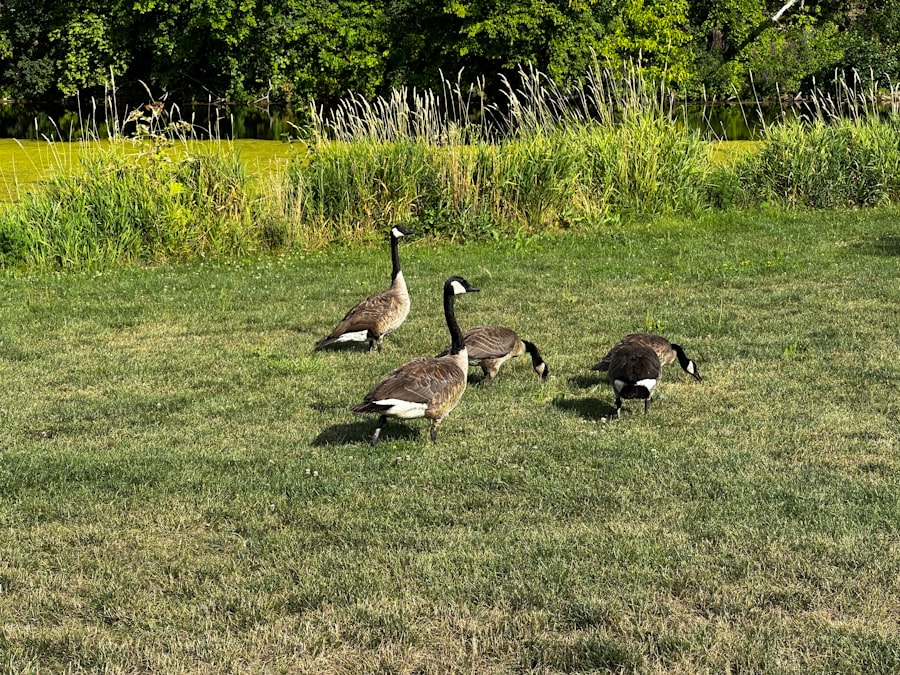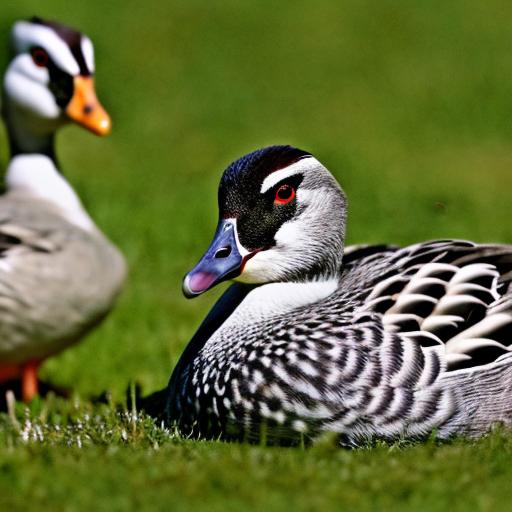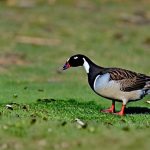Geese are known for their strong migratory instincts and their tendency to form strong social bonds. They are highly adaptable birds and can thrive in a variety of environments, including urban areas, parks, and golf courses. Geese are herbivores and primarily feed on grass, aquatic plants, and grains. They are also known to be territorial and can become aggressive when they feel threatened or when protecting their nests and young. Understanding the behavior of geese is crucial in developing effective strategies for geese control. By understanding their habits, feeding patterns, and nesting behaviors, it becomes easier to implement measures that deter geese from inhabiting certain areas.
Geese are also known for their strong homing instincts, which means that once they have established a nesting site, they are likely to return to the same location year after year. This makes it important to address geese control proactively rather than reactively. By understanding the behavior of geese, it becomes clear that a multi-faceted approach is necessary to effectively deter them from inhabiting certain areas. This may include physical barriers, natural repellents, sound and light deterrents, and maintaining a clean and unattractive environment for geese.
Key Takeaways
- Geese are social birds that exhibit territorial behavior and can become aggressive when they feel threatened.
- Physical barriers such as fences, hedges, and netting can effectively deter geese from entering certain areas.
- Natural repellents like citrus sprays, predator decoys, and reflective tape can discourage geese from settling in specific locations.
- Sound and light deterrents, such as ultrasonic devices and strobe lights, can be used to disrupt geese and make an area less appealing to them.
- Keeping the environment clean and free of food sources can make an area less attractive to geese and reduce the likelihood of them settling there.
- Seeking professional help from wildlife control experts can provide effective and humane solutions for managing geese populations.
- It is important to understand and comply with local and federal laws regarding the control and management of geese, including permits and regulations for relocation or removal.
Creating physical barriers to deter geese
One effective method for deterring geese from certain areas is by creating physical barriers that prevent them from accessing those spaces. This can include installing fences, hedges, or other structures that make it difficult for geese to enter and inhabit an area. For example, installing a fence around a pond or lake can prevent geese from accessing the water and feeding on aquatic plants. Additionally, using netting or other barriers to cover grassy areas can discourage geese from grazing in those spaces.
Another physical barrier that can be effective in deterring geese is the use of floating barriers on bodies of water. These barriers can prevent geese from accessing certain areas for feeding and nesting. Additionally, using visual deterrents such as decoy predators or reflective tape can also help in deterring geese from inhabiting specific areas. By creating physical barriers that make it difficult for geese to access certain spaces, it becomes easier to discourage them from establishing nesting sites and feeding grounds in those areas.
Using natural repellents to discourage geese
In addition to physical barriers, natural repellents can also be effective in discouraging geese from inhabiting certain areas. One common natural repellent is the use of plants that are unappealing to geese, such as tall grasses or shrubs with thorns. These plants can create an unattractive environment for geese and discourage them from nesting or feeding in those areas. Additionally, using natural scents such as citrus or peppermint can also deter geese from certain spaces.
Another natural repellent that can be effective in deterring geese is the use of dogs or other animals that are natural predators of geese. The presence of these predators can create a sense of danger for geese and discourage them from inhabiting certain areas. Additionally, using water sprays or sprinkler systems can also be effective in deterring geese from specific spaces. By using natural repellents, it becomes possible to create an environment that is unappealing to geese and discourages them from establishing nesting sites and feeding grounds.
Implementing sound and light deterrents
Sound and light deterrents can also be effective in deterring geese from certain areas. One common method is the use of sonic devices that emit sounds that are unpleasant to geese. These devices can create a sense of danger for geese and discourage them from inhabiting specific spaces. Additionally, using strobe lights or other visual deterrents can also be effective in deterring geese from certain areas.
Another method for implementing sound and light deterrents is the use of pyrotechnics or other noise-making devices that create a sense of danger for geese. These devices can startle geese and discourage them from establishing nesting sites and feeding grounds in those areas. By implementing sound and light deterrents, it becomes possible to create an environment that is unappealing to geese and discourages them from inhabiting certain spaces.
Maintaining a clean and unattractive environment for geese
One important aspect of geese control is maintaining a clean and unattractive environment that discourages geese from inhabiting certain areas. This includes regularly removing food sources such as spilled grains or bread crumbs that may attract geese. Additionally, keeping grassy areas mowed and free of debris can discourage geese from grazing in those spaces.
Another important aspect of maintaining a clean environment is managing water sources such as ponds or lakes to prevent the buildup of algae and aquatic plants that are attractive to geese. By regularly maintaining these water sources, it becomes possible to create an environment that is unappealing to geese and discourages them from establishing nesting sites and feeding grounds in those areas.
Seeking professional help for geese control

In some cases, seeking professional help for geese control may be necessary to effectively deter geese from certain areas. Professional wildlife management companies have the expertise and resources to develop comprehensive strategies for geese control that take into account the specific needs of each location. These companies can provide services such as habitat modification, population management, and ongoing monitoring to ensure that geese are effectively deterred from inhabiting certain areas.
Additionally, professional wildlife management companies can provide education and training for property owners and managers on how to effectively deter geese from specific spaces. By seeking professional help for geese control, it becomes possible to develop long-term strategies that effectively deter geese from establishing nesting sites and feeding grounds in those areas.
Understanding the legalities of geese control
It is important to understand the legalities of geese control when implementing strategies to deter them from certain areas. In many regions, geese are protected under wildlife conservation laws, which means that certain methods of control may be restricted or prohibited. It is important to research and understand the local regulations regarding geese control before implementing any strategies.
Additionally, obtaining permits or approvals may be necessary for certain methods of geese control, especially if they involve the use of sonic devices, pyrotechnics, or other deterrents that may impact other wildlife or public safety. By understanding the legalities of geese control, it becomes possible to develop strategies that comply with local regulations while effectively deterring geese from specific areas.
In conclusion, understanding the behavior of geese is crucial in developing effective strategies for geese control. By creating physical barriers, using natural repellents, implementing sound and light deterrents, maintaining a clean environment, seeking professional help, and understanding the legalities of geese control, it becomes possible to effectively deter geese from inhabiting certain areas while complying with local regulations. Geese control requires a multi-faceted approach that takes into account the specific needs of each location in order to develop long-term strategies for effectively deterring geese.
If you’re looking for ways to keep geese from pooping on your lawn, you might also be interested in learning how to care for goslings. Check out this informative article on how to care for goslings to ensure that you have all the knowledge and tips you need to raise healthy and happy geese.
FAQs
What are some effective methods for keeping geese from pooping on your lawn?
Some effective methods for keeping geese from pooping on your lawn include using decoys or scare tactics, installing physical barriers such as fences or netting, using repellents or deterrents, and modifying the landscape to make it less attractive to geese.
Are there any natural repellents that can be used to keep geese away from your lawn?
Yes, there are natural repellents that can be used to keep geese away from your lawn. These include planting certain types of grasses or plants that geese find unappealing, using natural scents such as citrus or garlic, and using water features such as sprinklers or ponds to deter geese.
What are some humane methods for keeping geese away from your lawn?
Some humane methods for keeping geese away from your lawn include using visual deterrents such as scarecrows or reflective tape, using noise deterrents such as loud noises or predator calls, and modifying the landscape to make it less attractive to geese without causing harm to the birds.
Are there any legal restrictions on how to keep geese away from your lawn?
There may be legal restrictions on how to keep geese away from your lawn, depending on the location and the specific methods being used. It is important to check local regulations and ordinances regarding wildlife management and bird control before implementing any strategies for keeping geese away from your lawn.
What are some long-term solutions for keeping geese from pooping on your lawn?
Some long-term solutions for keeping geese from pooping on your lawn include implementing habitat modification to make the area less attractive to geese, using exclusion methods such as fences or netting, and establishing a regular maintenance routine to discourage geese from frequenting the area.
Meet Walter, the feathered-friend fanatic of Florida! Nestled in the sunshine state, Walter struts through life with his feathered companions, clucking his way to happiness. With a coop that’s fancier than a five-star hotel, he’s the Don Juan of the chicken world. When he’s not teaching his hens to do the cha-cha, you’ll find him in a heated debate with his prized rooster, Sir Clucks-a-Lot. Walter’s poultry passion is no yolk; he’s the sunny-side-up guy you never knew you needed in your flock of friends!







